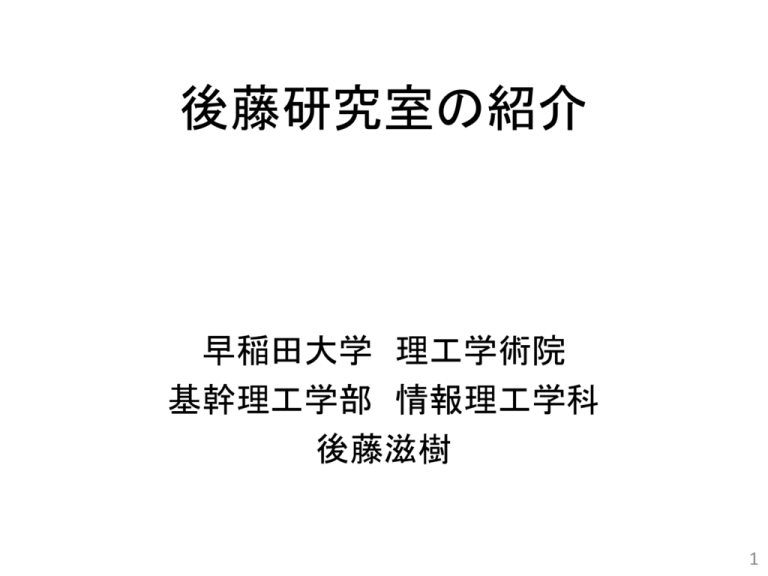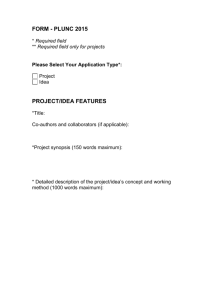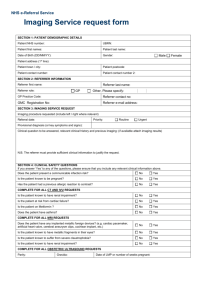goto-lab-for-NEC
advertisement

後藤研究室の紹介
早稲田大学 理工学術院
基幹理工学部 情報理工学科
後藤滋樹
1
1. Drive-by-Download Attack
Beyond simple URL and referrer tests
Landing site
Vulnerable
browsers
& plugins
Redirect
Hopping site
…
…
Exploit site
Malware site
© Daiki Chiba, Waseda Univ.
2
Analysis Method
• Analyze communication data by three tests
URL test
Referrer test
Host test
Check URLs and
Location field in
HTTP response
Check
Referrer field in
HTTP request
Check Host
(IP address and
Domain name)
behavior in
a Session
© Y. Takata
3
Proposed Method, Step 1: URL Test
• 1. URLs in HTTP data of an HTTP response
– Occurrence of GET request for the URL
• 2. The URL in the “Location” field
– The HTTP status code “3xx”
GET request Header
GET /foo/index.php HTTP/1.1
Request Version: HTTP/1.1
Accept: */*
Referer: http://hoge.com/index.html
Accept-Language: en-us
Connection: Keep-Alive
Host: hoge2.com
Contents URL
http://hoge2.com/foo/index.php
HTTP response Header
HTTP/1.1 200 OK HTTP Status Code
Date: Mon, 08 Mar 2010 10:43:21 GMT
Server: Apache/2.2.3 (CentOS)
Content-Length: 27919
Connection: Keep-Alive
Content-Type: text/html
Search
Extracted URLs
['http://hoge2.com/test.index‘,
'http://hoge3.com/attack.php']
4
HTTP status code
code
1xx
2xx
3xx
4xx
5xx
status
Informational
Successful
Redirect
Client error
Server error
RFC 2616, Hypertext Transfer Protocol – HTTP/1/1, June 1999.
5
Proposed Method, Step 2: Referrer Test
• The URL set in the “Referrer” field
– Occurrence of GET request for the URL
*Referrer・・・The referrer identifies the address of the webpage of the resource
which links to it. By checking the referrer, the new webpage can see where the
request was originated.
HTTP response Header
GET request Header
GET /foo/index.php HTTP/1.1
Request Version: HTTP/1.1
Accept: */*
Referer: http://hoge.com/index.html
Accept-Language: en-us
Connection: Keep-Alive
Host: hoge2.com
Search
APAN Network Research Workshop
HTTP/1.1 200 OK
Date: Mon, 08 Mar 2010 10:43:21 GMT
Server: Apache/2.2.3 (CentOS)
Content-Length: 27919
Connection: Keep-Alive
Content-Type: text/html
Create the file URL from the GET request Header
for this HTTP response
File URL
http://hoge2.com/foo/index.php
6
Proposed method 3: Host test
Associate redirections based on appeared Host
Server 1 (IP:x.x.x.x, test.com)
1:15.4
1:17.0
1:18.1
10:13.6
The Host means a Server
Server 2 (IP:y.y.y.y, hoge.co.jp) IP address and domain name
1:19.1
1:20.4
1:24.4
D
DNS
D
S
S
D
D
S
S
S
3-way
(SYN)
S
G
G
S
S
G
G
G
GET
G
H
H
G
G
H
H
H
HTTP
H
G
G
H
H
G
G
F
FIN
RST
G
H
H
G
G
H
H
H
G
G
H
H
G
G
G
H
H
G
G
H
H
H
H
H
Session from an Entrance
Web site
Session from an Entrance
Web site (Identify Referrer
test and URL test)
Sessions from not an
entrance Web site (cannot
identify by Referrer test
and URL test)
Session identified by Host
test (Only near session
started SYN)
Not the Same Redirection
F
←Start
F
F
Session
APAN Network Research Workshop
F
F
F
F
End→
7
Host test is effective
URL Test
GET requests for URLs in a HTTP data and a Location field
Referrer Test
A GET request for the URL set in the Referrer field
Host Test
e.g. A result of obfuscating a program
alert(“Hello, World!!”);
Associate redirections based on a Host
(IP address and Domain name)
Table. Tests to acquire malicious distribution URLs
Date
Total of malicious URLs
March 8th
March 9th
202
205
URL Test
12 (5.9%)
10 (4.9%)
Referrer Test
13 (6.4%)
13 (6.3%)
Host Test
March 11th
158
Hide URLs by obfuscating
and redirect users
10 (6.3%)
without a Referrer field
6 (3.8%)
177 (87.6%) 182 (88.8%) 142 (89.9%)
© Y. Takada
8
2. Priority crawling (1) IP address
Hilbert Curve
http://en.wikipedia.org/wiki/File:Hilbert_curve.svg
• Skewed IP addresses
– Hilbert curve
■blue: benign
■red: malicious
– ExOctet Method by D. Chiba
The IP address is an important
parameter to tell if the URL is
malicious or benign.
© D. Chiba
9
Priority crawling (2) new domain names
• “Whois” information
• When a domain name is
registered?
• Malicious domain names are
new.
• parameter
W = dn – d
(dn: the current date、d: date of the registration)
CDF: Cumulative Distribution Function
How many years past after the registration?
Red: malicious, Blue: benign
© Daiki Chiba, Waseda Univ.
10
2. Priority crawling (3) FQDN length
CCDF: Complementary Cumulative Distribution
Function
Red: malicious, Blue: benign
• Length of the FQDN
character string
• Malicious FQDN is long.
• parameter
L = (length of FQDN string)
• Example:
www.waseda.jp (L=13)
9d2c76904ddcb022c5e1bb604
b9b037g.example.com (L=44)
Length of FQDN character string
11
2. Priority crawling (4) FQDN entropy
• Entropy of FQDN character string
CCDF (Complementary Cumulative Distribution Function)
Malicious domain names are
Entropy of a malicious FQDN is large.
composed randomly.
Red: malicious, Blue: benign
• Parameter: FQDN X {x1 , x2 ,, xn }
p(xi ) = probability of xi
n
E p ( xi ) log p ( xi )
i 1
Entropy of FQDN character strings
• Example:
www.waseda.jp (E=2.78)
9d2c76904ddcb022c5e1b
b604b9b037g.example.co
m (E=4.18)
12
Information entropy
Uncertainty
𝑢 = log 2 8 = 3
1
𝑢 = −log 2
8
Average uncertainty
http://item.rakuten.co.jp/headwear/780897
𝑢
13
Probability P(xi)
Character string=
“abcabcaabaacaabc”
p(a)=8/16, p(b)=4/16,
p(c)=4/16.
E=--{(8/16)*log(8/16)+
2*(4/16)*log(4/16)}
= 1.5
occurrences of alphabet characters
occur percentage
http://www.nii.ac.jp/userdata/shimin/docu
ments/H23/111102_5thlec.pdf
The natural occurrence
of alphabet has been
Total
investigated. http://www7.plala.or.jp/dvorakjp/hinshutu.htm
14
2. Priority crawling (5) FQDN n-gram
Top 30 n-gram (n=2)
frequency of occurrences
Red: malicious, Blue: benign
• n-gram (n=2) of FQDN strings
• Malicious and benign FQDNs
• parameter
{g-0, … , gk, … , gz9}
(gk: n-gram文字列 k の出現頻度)
frequency
• 2-character strings
→ which has one numeral or
one symbol.
• Example: a1-a2.example.com
→ a1, 1-, -a, a2, 2., .e, e., .c
15
3. NICTER or darknet
• All the hosts on the Internet have IP addresses.
• It is difficult to allocate all the IP addresses to real
hosts. There are certain number of unused or
unallocated IP addresses.
• Questions:
If we observe an unsed IP address block, can we
observe any incoming traffic to the IP addresses?
Answer: Yes.
16
3. NICTER or darknet
It is meaningful to collect a
large number of IP packets
which have unallocated IP
addresses as the destination.
http://www.nict.go.jp/glossary/nicter.html
(Japanese text)
http://www.nicter.jp/nw_public/scripts/index.php#nicter
(nicterweb)
http://www.youtube.com/watch?v=jLYs52OBh_A
(movie)
17
4. DarkPots
© Akihiro Shimoda
Vacancy Checker
Forwarder
Analyzer
Analyzers
emulated
response
DarkPots
System
list of unused-IPs
Forwarder
Vacancy checker
mirroring
The Internet
18
Gateway Router
(ACLs deployed)
Enterprise / Campus
Network
Attack counts per source
The last two slides are not
properly shown in the PDF.
Please refer to a separate
PDF file.
in time series on the honeypot analyzer
(top 7 heavy-hitters)
19
The second experiment:
Comparison of botnet attacks
Continuous
Random
attack count
Continuous
20
Random
The last two slides are not
properly shown in the PDF.
Please refer to a separate
PDF file.
5. Android malware
Android application (.apk)
Manifest file (AndroidManifest.xml)
Application programs (classes.dex)
Application resources
21
Manifest file
Manifest file must be present in all Android applications
It takes the form of “AndroidManifest.xml”
This file has essential information about Android application
- 24 kinds of information are described
Manifest file (AndroidManifest.xml)
The version number of an application
Intent filter
Required permission
Required API level
・
・
・
22
Proposed method : Keyword lists (1)
With this new method, several keyword lists are compiled
for an application
Benign or malicious strings† in a manifest file are recorded in
the keyword list
Four types of keyword lists:
(1) Permission
(2) Intent filter (action)
(3) Intent filter (category)
(4) Process name
†(5) Intent filter (priority) and (6) Number of redefined permission
are represented by an integer, and not a text string
23
Experiment : Result
Correct detection (%) Incorrect detection (%)
Benign samples
91.4
8.6
Malware samples
87.5
12.5
Total
90.0
10.0
• Correct detection : correct detection to the total number
• Incorrect detection : incorrectly detection to the total number
24


